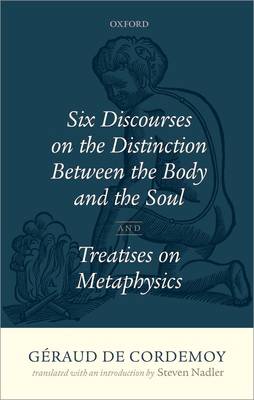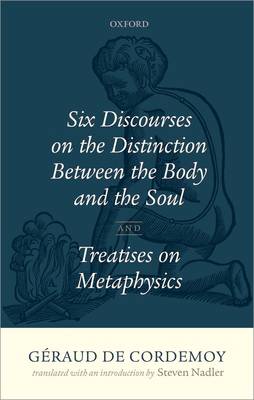
- Afhalen na 1 uur in een winkel met voorraad
- Gratis thuislevering in België vanaf € 30
- Ruim aanbod met 7 miljoen producten
- Afhalen na 1 uur in een winkel met voorraad
- Gratis thuislevering in België vanaf € 30
- Ruim aanbod met 7 miljoen producten
Zoeken
Geraud de Cordemoy: Six Discourses on the Distinction Between the Body and the Soul
Steven Nadler
Hardcover | Engels
€ 128,95
+ 257 punten
Omschrijving
Steven Nadler presents the first English translation of a seminal work in the history of early modern philosophy. Geraud de Cordemoy's Six Discourses on the Distinction Between the Soul and the Body (originally published in French in 1666) offers an account of the mind and the body in a human being. Cordemoy is an unorthodox Cartesian who opts for an atomist conception of body and matter. In this groundbreaking treatise, he also presents one of the earliest arguments for an occasionalist account of causation, with God serving as the true cause of bodily motions in the world and of ideas in the mind. Nadler also includes the first English translation of Cordemoy's short Treatises on Metaphysics, which were probably written soon after the Discourses, and extend his discussion of mind-body union with consideration of human freedom and happiness. The introduction provides a biographical and historical context for Cordemoy's work and a study of his main philosophical doctrines, including his influence on later thinkers (such as Leibniz and Malebranche).
Specificaties
Betrokkenen
- Auteur(s):
- Uitgeverij:
Inhoud
- Aantal bladzijden:
- 170
- Taal:
- Engels
Eigenschappen
- Productcode (EAN):
- 9780198713319
- Verschijningsdatum:
- 30/06/2015
- Uitvoering:
- Hardcover
- Formaat:
- Genaaid
- Afmetingen:
- 140 mm x 216 mm
- Gewicht:
- 340 g

Alleen bij Standaard Boekhandel
+ 257 punten op je klantenkaart van Standaard Boekhandel
Beoordelingen
We publiceren alleen reviews die voldoen aan de voorwaarden voor reviews. Bekijk onze voorwaarden voor reviews.











